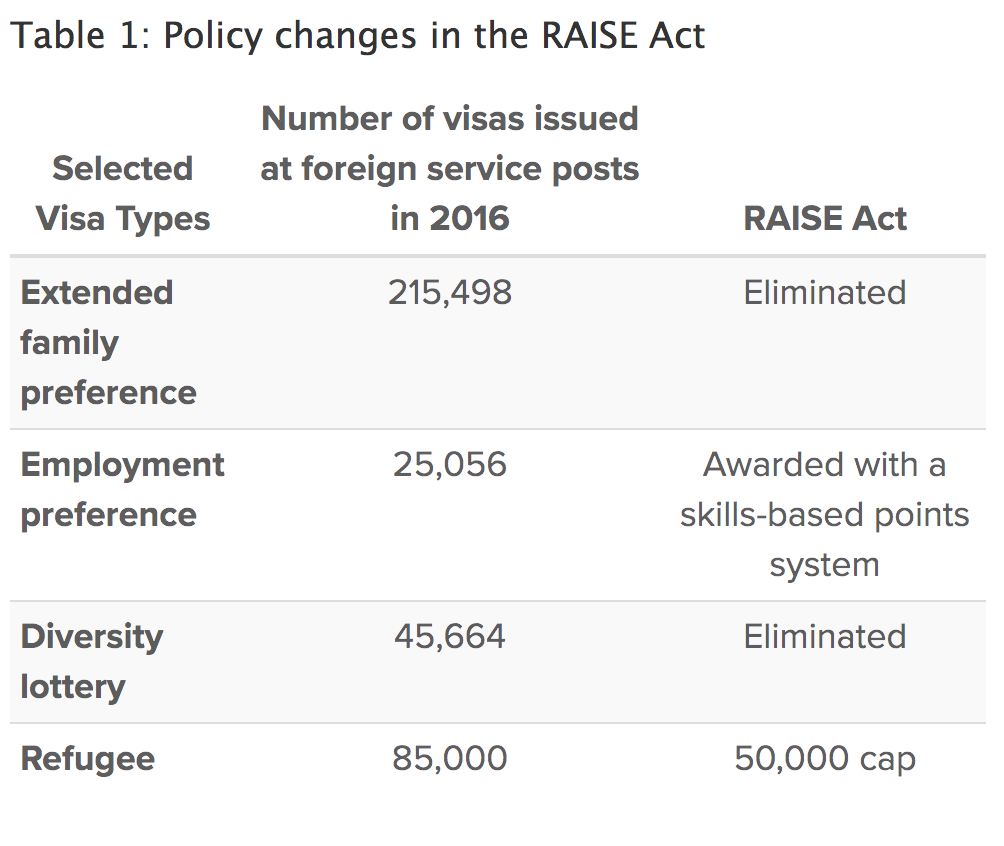On Thursday, August 10, 2017, the prestigious Wharton School at the University of Pennsylvania released a report which discusses the effect that the RAISE Act would have on the country’s economy. The RAISE Act is a Senate bill that was recently introduced by Republican Senators Tom Cotton (R-AR) and David Perdue (R-GA), which seeks to cut the legal immigration system in half. The President threw his support behind the bill shortly after it was introduced.
The Wharton report projects that if passed, the RAISE Act, would result in a loss of 4.6 million jobs by the year 2040, a reduction in GDP that will be 2 percent lower than the current rate by the year 2040, and a reduction in the country’s GDP by 0.7 percent by the year 2027.
On the flip side, the report projects that there will be “very little change” to individual per capita GDP, despite the fact that the RAISE Act would dramatically reduce the country’s population size, the number of jobs available, and the country’s GDP.
The report uses the Penn Wharton Budget Immigration Policy Model to make projections on the impact that the RAISE Act would have on the country’s economy.
Under the RAISE Act, legal immigration would be reduced by 50% while immigration would increase at a rate of 75% for immigrants with at least a college degree.

Table 1 shows provisions included in the RAISE Act. Immigrant visas with employment preference would be awarded using a skills-based points system. Specifically, immigrant visa applicants would receive points based on education, English language skills, job offers, age, extraordinary achievements, and entrepreneurship. Family preferences for immigrant visas would be limited to spouses and minor children and the diversity lottery immigrant visa program would be eliminated. In addition, the number of refugees would be limited to 50,000 annually.
Sponsors of the act expect it to reduce legal immigration by 40% in just the first year, with additional reductions gradually leaning toward 50% by year 10. The bill is also expected to increase the number of legal immigrants with college degrees. Wharton projects that 75% of highly skilled legal immigrants will have at least a college degree.
The Wharton report further projects that:
- If immigration is decreased by 50 percent, the economy will be two percent smaller in 2040, even though 75 percent of those immigrants will now have at least a college degree;
- Between now and 2040, the economy will grow at about 1.6 percent per year on average rather than about 1.7 percent;
- The RAISE Act will increase per capita GDP by 0.02 percent by 2027, because the capital stock will be similar to before the reform while the pool of workers will be smaller;
- By 2040, per capita GDP will be 0.30 percent lower than under current policy;
- Employment will decrease because the pool of domestic workers will not be sufficient to fill the number of jobs that would have been held by low skilled immigrants that are no longer eligible to immigrate under the RAISE Act;
- In its first year, under the RAISE Act, employment would decrease by 92,538 jobs;
- After 10 years, employment would decrease by 1.3 million jobs;
- By 2040, employment losses would surge to 4.6 million.
Overall, the RAISE Act would reduce the rate of immigration, while increasing the pool of highly skilled college educated immigrant workers. The RAISE Act will make it easier for highly skilled individuals to immigrate to the United States at a cost. The United States economy will take a substantial hit given that there will be decreased economic growth and significant job losses given that domestic workers will not be able to fill jobs that were once occupied by low skilled immigrant workers. In the short run, Wharton projects that there would be a small boost to per capita GDP, although in the long run per capita GDP would take a slight dip.
To read the report please click here.
 Visa Lawyer Blog
Visa Lawyer Blog


